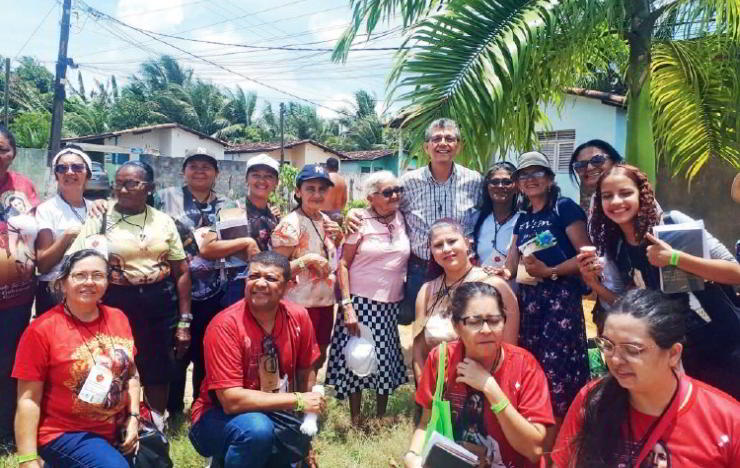Father Joaquim Pereira, a Portuguese Comboni missionary, shares his pastoral experience in the parish of Santo António in Marcos Moura, a neighbourhood in the municipality of Santa Rita in the Brazilian state of Paraíba.
The social reality of Marcos Moura is marked by widespread poverty, increasing violence, and the great challenges that families face daily. Over time, I have become involved in the various pastoral programs of the Christian communities, which we seek to support with zeal, love, and compassion, following the example of Jesus. We know well that all pastoral work is linked to the mission of Christ, the Good Shepherd.
The welcome I received from the Christian communities was warm and affectionate. They made me feel part of this great family that is the people of God. They are simple, respectful, and hospitable people, because daily life is difficult for most of the people who live in this neighbourhood in the municipality of Santa Rita, in the state of Paraíba. Despite the harshness of life, they do not lose their joy in life and their kindness in dealing with others.
Starting from the premise that pastoral work is fundamentally the proclamation of Christ to the world and collaboration in the Father’s humanising plan, it involves not only pastors but the entire Christian community. I have always believed in community leadership, not individual leadership. The pace, methods, and ways of doing things vary from one historical situation to another in which the Gospel is proclaimed and incarnated.
During my brief tenure as a pastoral worker in the parish of Marcos Moura, my work centred primarily on listening, closeness, and accompaniment, to proclaim the Gospel and foster Christian formation. Our interlocutors are people who already know Christ.
Pastoral challenges focus on reaching out to Christians whose faith remains relatively superficial or traditional. But we also feel the need to seek out the “lost sheep.” The evangelical churches that throng the streets, with their shouts and proselytism, can “capture” those Catholic Christians who are most unprepared in terms of faith and commitment.
In the ecclesial context in which we live, where our Christian communities are relatively small, we have tried to encourage Christians to live their vocation in the Church with a missionary approach, encouraging them to have a stronger presence in people’s homes through scheduled visits during which they recite the rosary and celebrate the Eucharist, bringing together Christians living in that area, as well as organising other initiatives. I greatly appreciate the steps some communities have taken in this direction, that of “going out into the streets” to evangelise, but there is still much to be done.
Pastoral work includes, among other things, service to those in need, Bible study, and the celebratory dimension we have sought to promote in our Christian communities. Aware of being part of a very poor social reality, with multiple human and emotional needs, the challenge for our communities is to participate more generously in this service to those most in need.
The parish, through its Children’s Ministry, offers support to minors and their families in difficulty. There are also other social institutions, managed and designed by the Comboni Missionaries and their teams, which provide extraordinary support to the most disadvantaged members of the population. These include the Community Educational Formation Centre, run by the Sisters of Divine Providence; the Dom Óscar Romero Human Rights Defence Centre; the Legal Project, a support programme for children and adolescents in conditions of social vulnerability; and the Waste Collection Cooperative.
We feel the need to reactivate and strengthen youth, family, and vocation ministry. However, there is enormous work to be done to raise awareness and involve them more fully in the community’s various ministries.
Finally, I would like to express a heartfelt desire: to see a less clerical and more pastoral diocesan Church. Perhaps I’m wrong, given that I’ve only been here a short time, but it’s a sentiment I wish to express in a fraternal way. Quoting Pope Francis, I have the impression that the underlying attitude of most of our clergy is that of being “state clerics” and not “pastors of the people.” This is a clear sign that there is still a certain resistance to breaking free from “clerical” certainties.
I dream of a pastoral ministry based on listening, closeness, and accompaniment, because that’s what Jesus did, part of his teaching, the way he acted in people’s lives, always starting from their concrete and existential situations, and in constant communion with the Father who sent him as a servant of all. Aware of my limitations, I too want to follow the same path.






